Este artigo foi publicado originalmente no Financeiro de marca anual 2020. Analisamos acordos recentes que se tornaram fundamentais para a indústria.
What is the allure for foreign investment and why is football becoming the most lucrative choice for those looking to expand their portfolios? We look into recent deals that became key for the industry.
No 27 TH de novembro de 2019, o Abu Dhabi United Group anunciou que estava vendendo uma participação de 10% no Grupo de Futebol da Cidade (CFG) para a empresa de private equity Silver Lake Partners. O acordo colocou um valor no grupo em US $ 4,8 bilhões (4,4 bilhões de euros).
O anúncio do acordo destacou duas tendências principais no mundo do futebol; Em primeiro lugar, o crescente apetite de investidores estrangeiros em clubes de futebol europeus (principalmente dos investidores dos EUA) e, em segundo lugar, a viabilidade financeira de um clube de futebol como um investimento sólido. Embora o tópico do investimento estrangeiro em clubes de futebol da Premier League nunca esteja muito abaixo da superfície, após o recente anúncio da Supersiga Europeia (ESL) e a reação subsequente, o debate polarizador da propriedade estrangeira levantou sua cabeça mais uma vez como o principal assunto controverso do futebol. Tome decisões de patrocínio e parceria de marca usando dados concretos. Consulte o nosso
Act with confidence. Make sponsorship and brand partnership decisions using hard data. See our Serviços de consultoria para mais informações. Ou Entre em contato conosco diretamente. Adoramos conversar. A promessa de investimento em um clube na forma de expansão do estádio, instalações de treinamento aprimoradas e aumento de gastos no mercado de transferências é uma proposta lucrativa. Não há uma prova maior dos benefícios de um grande investimento de um proprietário estrangeiro do que o de Manchester City, que desde então foi assumido pelo grupo United do Abu Dhabi Investment United, conquistou cinco títulos da Premier League, duas Copas da FA e 6 liga C
Foreign ownership can be a contentious subject for all stakeholders of a football club, but particularly so for football fans. The promise of investment into a club in the form of stadium expansion, improved training facilities and increased spending in the transfer market is a lucrative proposition. There is no greater proof of the benefits of a large investment from a foreign owner than that of Manchester City, who since being taken over by the Abu Dhabi Investment United Group have gone on to win five Premier League titles, two FA Cups and 6 League C U || 113 ps. The benefits of the vast investments that foreign owners have the potential to make extend beyond the field of play too, with the Greater Manchester community benefitting from the gentrification of the area.
However, the counter argument for foreign ownership often cited is that the investors lack an in-depth understanding and respect for the traditions and history of a club, a lack of financial transparency, and poor relations with fans and other stakeholders. One needs only to look at the red half of Manchester to understand how potentially damaging a fractious relationship between foreign owners and fans of the club can be both on and off the pitch.
According to the latest UEFA club benchmarking report, 40% of Premier League clubs are majority owned by foreign investors, with an additional 35% of Premier League teams having foreign investors as minority stakeholders. This article will explore the financials of three clubs - Manchester City, Newcastle United, and Manchester United - to highlight why Premier clubs are so attractive to foreign owners and why in some cases the fans are not happy.
Manchester City
Focando mais de perto os mais recentes resultados financeiros do Manchester City fornece uma boa indicação do caso para o investimento bem-sucedido no clube com retornos crescentes ano a ano. 2019 foi um ano recorde em termos de receita, com o clube relatando receita total de € 590 milhões (£ 535 milhões). De acordo com as mais recentes demonstrações financeiras disponíveis, que incluem três meses de futebol com impacto da Covid, o City sofreu um declínio esperado nas receitas. O crescimento da receita nos últimos 5 anos é amplamente atribuído a excelentes performances de campo, o que gerou uma parcela mais alta da receita de transmissão da Premier League e, finalmente, atraiu melhores acordos comerciais de patrocinadores, como o lucrativo acordo de 10 anos com £ 650 milhões.
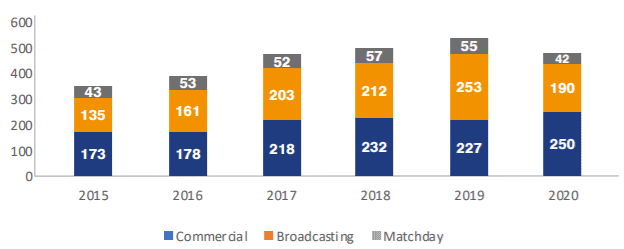
Since 2015, Manchester City has grown its revenues at a compound annual rate of 27%. 2019 was a record year in terms of revenue, with the club reporting total revenue of €590 million (£535 million). According to the latest available financial statements, which includes three months of COVID impacted football, City experienced an expected decline in revenues. Growth in revenue over the past 5-year term is largely attributable to excellent on field performances which generated a higher share of Premier League broadcasting revenue and has ultimately attracted better commercial deals from sponsors, such as the lucrative 10-year Puma deal with a reported £650 million.
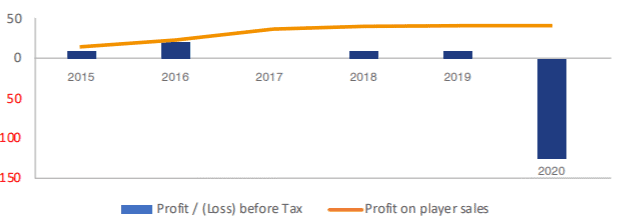
Após as perdas sustentadas iniciais que ocorrem no início do investimento de Sheik Mansour no clube, o Manchester City teve cinco anos seguidos de lucratividade. No entanto, em 2020, a cidade girou de um lucro de 10 milhões de libras em 2019 para uma perda de £ 125 milhões em 2020. Embora os impactos da pandemia tenham um grande papel a desempenhar na perda significativa incorrida pela cidade, a renda em dianteira que não tem uma contagem de renda em dia! Oportunidades
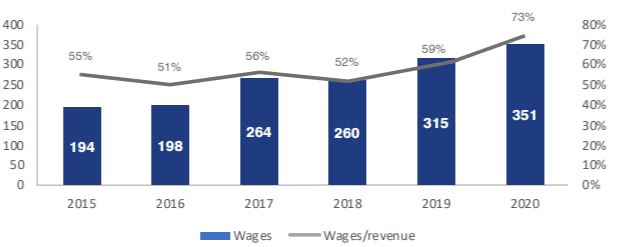
Expanded Opportunities
Silver Lake tem um histórico de investimentos nos setores de tecnologia e esporte, tendo investido anteriormente em artistas como Alibaba, Skype e o Ultimate Fighting Championship (UFC). A empresa acredita que há uma forte convergência em entretenimento, esporte e tecnologia. Isso poderia alavancar seu envolvimento na tecnologia e entretenimento para aumentar a marca do Manchester City em várias plataformas e geografias, particularmente em mercados não tradicionais, como os EUA e a China. Sem dúvida, o grupo United Abu Dhabi United achou esse candidato atraente quando o acordo foi feito em parte com 10% do CFG. O atual proprietário, Mike Ashley, tem um mandato tumultuado desde que adquiriu o clube em 2007. Os torcedores do Newcastle United não fizeram segredo do fato de que querem que Ashley fosse, e Ashley não fez nenhum favor a melhorar seu relacionamento com os fãs; Certa vez, ele admitiu nunca ter visitado o site oficial do clube. Entre o final de 2019 e o primeiro semestre de 2020, os rumores circulavam um acordo em potencial com um consórcio do Oriente Médio liderado pelo Fundo de Investimento Público (PIF) da Arábia Saudita, que valorizaria o clube entre 330 milhões de euros e 390 milhões de euros. Para referência, o financiamento da marca avaliava o Newcastle United na época em 457 milhões de euros. No entanto, no final de 2020, o consórcio retirou oficialmente sua oferta. Uma análise mais detalhada das Finanças do Newcastle United explica por que os investidores do Oriente Médio estavam interessados em adquirir o clube. Participação na principal liga da Inglaterra. A receita comercial ficou estagnada nos últimos anos. Um período prolongado jogando futebol da Premier League (e potencialmente desafiador para o futebol europeu, como o clube fez no final dos anos 90) poderia ver o interesse renovado de patrocinadores e parceiros comerciais e melhorar ainda mais as perspectivas de receita e o desenvolvimento de Newcastle no futuro. No entanto, seu lucro antes dos impostos melhorou em 18 milhões de libras. O aumento do lucro ano a ano de 2018 a 2019 é amplamente atribuível à venda astutiva de jogadores durante a janela de transferências. Infelizmente, o Newcastle United ainda não divulgou o relatório anual de 2020, por isso resta ver o quão grave o impacto do Covid-19 tem sido no estado financeiro do clube. Com a possível exceção de um covidado 2020 e um rebaixamento impactado em 2017, o Newcastle tem sido consistentemente lucrativo nos últimos 5 anos. Isso pode significar potencialmente um forte balanço patrimonial para fazer incursões no mercado de transferências. O relacionamento fratioso entre Mike Ashley e a base de fãs de Newcastle é a prova de que não são apenas proprietários estrangeiros que podem causar angústia entre os fãs de futebol local. Uma injeção de dinheiro da vasta riqueza do PIF, ou mesmo de outro pretendente em potencial que poderia ser usado para investir na infraestrutura do clube, além de trazer algum talento de classe mundial em campo, pode ser um ponto de virada na restauração do Newcastle United à sua antiga glória e provar ser um investimento experiente simultaneamente.
Newcastle United
Another club that has been firmly in the media spotlight for a potential change of ownership is Newcastle United. The current owner, Mike Ashley, has had a tumultuous tenure since he acquired the club in 2007. Newcastle United fans have made no secret of the fact that they want Ashley gone, and Ashley has done himself no favours in improving his relationship with the fans; he once reportedly admitted to never having visited the club’s official website. Between late 2019 and the first half of 2020, rumours circulated of a potential deal with a Middle Eastern consortium led by the Public Investment Fund (PIF) of Saudi Arabia, that would value the club at between €330 million and €390 million. For reference, Brand Finance valued Newcastle United at the time at €457 million. However, in late 2020, the consortium officially withdrew its offer. A closer look at Newcastle United’s financials explains why the Middle Eastern investors had been interested in acquiring the club.
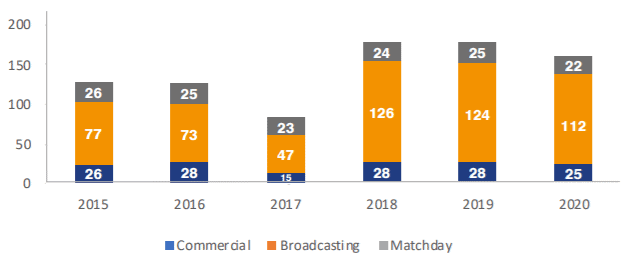
The club reported revenues of £159 million for the financial year ending June 2020. Over 70% of revenue earned is attributable to broadcasting income as a direct result of playing in the Premier League, which highlights the importance of Newcastle’s continued participation in England’s flagship league. Commercial revenue has been stagnant in recent years. A prolonged period playing Premier League football (and potentially challenging for European football as the club did in the late 90’s) could see renewed interest from commercial sponsors and partners, and further improve Newcastle’s revenue prospects and development in the future.
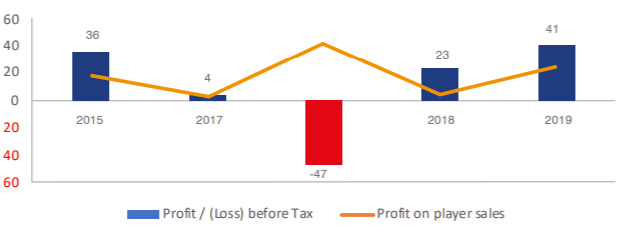
In 2020, Newcastle finished 13th in the Premier League, three places lower than the previous season. Yet, their profit before tax improved by £18 million. The year-on-year profit increase from 2018 to 2019 is largely attributable to the shrewd sale of players during the transfer window. Unfortunately, Newcastle United have yet to release the 2020 annual report, so it remains to be seen how severe the impact of COVID-19 has been on the financial state of the club. With the possible exception of a COVID impacted 2020 and a relegation impacted 2017, Newcastle have been consistently profitable over the last 5 years.
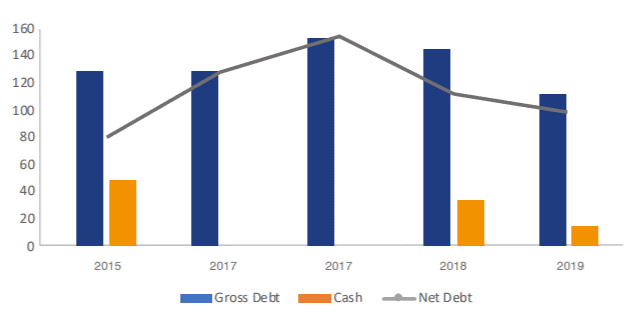
Newcastle have been slowly chipping away at the overall debt used to the fund the club, with net debt sitting at £98 million (considerably lower than the £152 million high in 2017). This could potentially mean a strong balance sheet from which to make inroads in the transfer market.
The Newcastle brand has arguably been underperforming relative to the stature and history of the club. The fractious relationship between Mike Ashley and the Newcastle fan base is proof that it is not just foreign owners that can cause angst among local football fans. An injection of money from the vast wealth of the PIF, or indeed another potential suitor which could be used to invest in the infrastructure of the club as well as bring in some world-class talent on the pitch, could prove to be a turning point in restoring Newcastle United to its former glory and prove to be a savvy investment simultaneously.
Manchester United
A aquisição de alto nível do Manchester United pela família Glazer em 2005 não foi isenta de controvérsia, particularmente entre algumas facções da base de fãs. No entanto, apesar das recentes lutas de desempenho em campo, o clube tem sido inquestionavelmente o poder financeiro predominante no futebol inglês. No entanto, o preço das ações sofreu declínios devido ao impacto do Covid e do recente escândalo de ESL. Atualmente, o Finanças da marca calcula o valor corporativo do Manchester United em 2,7 bilhões de libras dentro da última classificação do futebol financiador da marca 50 2021. £ 627 milhões no total. O crescimento da receita foi amplamente impulsionado por um aumento de 18% na receita de transmissão gerada pelo novo acordo europeu de transmissão. No entanto, como resultado direto do impacto do Covid, o United sofreu um declínio de 19% na receita geral de até 509 milhões de libras. As partidas de portas fechadas e os descontos de receita de transmissão foram os principais impulsionadores da queda na receita. Isso pode ser amplamente atribuído aos recursos significativos de geração de receita da marca e a uma taxa de salário/receita relativamente na verificação (49%). De fato, uma grande razão para a angústia sentida por muitos fãs do Manchester United é a maneira como os Glazers assumiram o controle do Manchester United em 2005, usando uma compra de alavancagem para comprar o clube.
Being one of only two publicly listed football clubs operating in England, Manchester United’s enterprise value is currently valued at £2.3 billion by the wider market. However, the share price has experienced declines due the impact of COVID and the recent ESL scandal. Brand Finance currently calculates Manchester United’s Enterprise Value at £2.7 billion within the latest Brand Finance Football 50 2021 ranking.
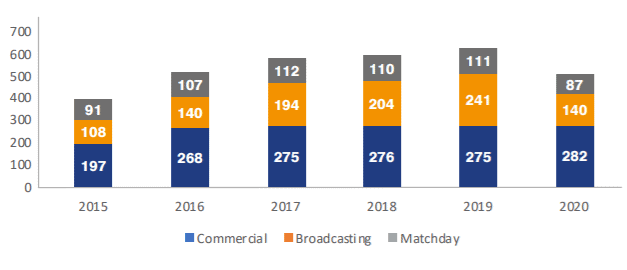
Despite finishing 6th in the 2019-20 season, Manchester United became the first Premier League club to report revenues in excess of £600 million, generating £627 million in total. Revenue growth was largely driven by an 18% increase in broadcasting revenue generated through the new European broadcasting agreement. However, as a direct result of the impact of COVID, United has experienced a 19% decline in overall revenue down to £509 million. Closed door matches, and broadcast revenue rebates were the main drivers behind the fall in revenue.
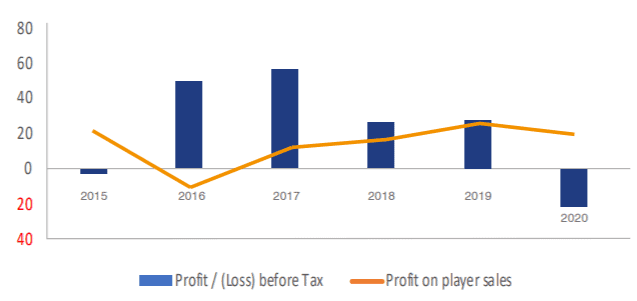
Manchester United has managed to maintain a healthy level of profit, except for the COVID affected 2020 financial year end. This can largely be attributed to the significant revenue generating capabilities of the brand and a relatively in-check wage/revenue ratio (49%).
However, this figure is greatly reduced when accounting for the interest payments made on the large amount of debt incurred because of the takeover by the Glazers. In fact, a large reason for the angst felt by many Manchester United fans is the way the Glazers took control of Manchester United in 2005, using a leverage buyout to purchase the club.
Uma compra alavancada envolve o uso de dívidas para comprar o clube e, em seguida, colocar essa dívida no balanço patrimonial, o que incorre em um custo de juros a cada ano. Em média, nos últimos cinco anos, a despesa de juros da dívida líquida foi de 9%, o que é um número significativo. De fato, desde 2010, o Manchester United pagou um total de £ 565 milhões em despesas de juros.
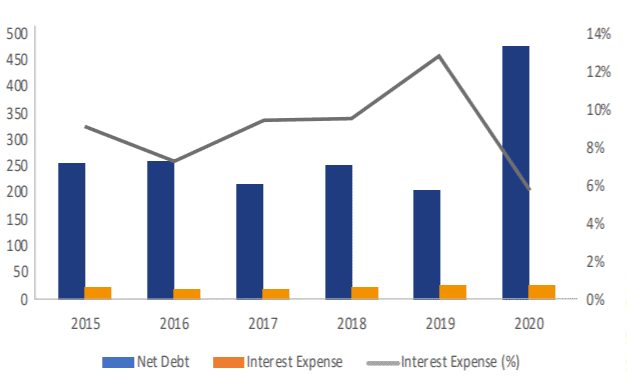
Manchester United has the highest EBITDA of any team in the Premier League, which serves as a testimony to the value of the Manchester United brand and the club’s ability to leverage that to generate ever increasing commercial partnership fees all over the world.
Isso é o que mantém os glazers e, de fato, qualquer outro potencial futuro investidores, extremamente interessado. A percepção geral dos clubes de futebol é que eles são um negócio volátil e em que os investidores devem estar cansados. De fato, de acordo com a atividade em torno de clubes de futebol de capital aberto, o preço das ações pode flutuar substancialmente com base no curto prazo nas performances de campo ou na transferência de atividades de mercado. Dos anos, nossa equipe de serviços esportivos expandiu sua cobertura para estudar as percepções dos fãs de futebol. Você pode encontrar as informações mais recentes sobre como clubes e marcas corporativas podem usar essas informações para gerar valor para suas marcas e empresas
However, the likes of Manchester City, Liverpool, and Manchester United are indicative of the fact that a long-term investment at the right price can yield excellent financial returns for those willing to take the
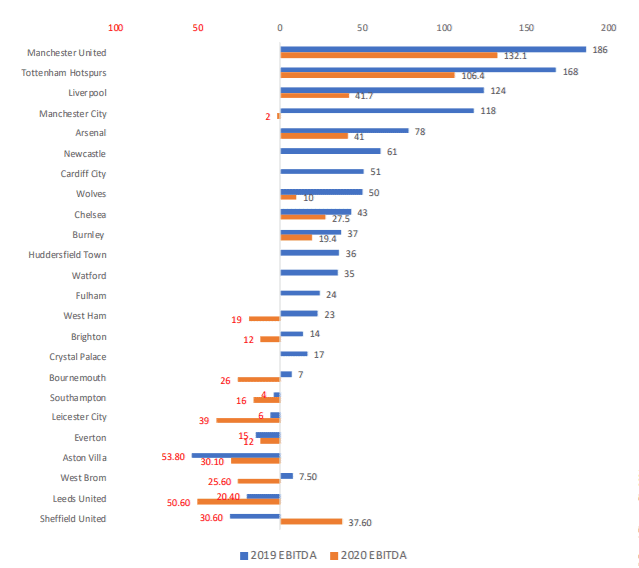
In the past couple of years, our sports services team have expanded their coverage to study the perceptions of football fans. You can find the latest insights into how clubs and corporate brands can use this information to generate value for their brands and businesses aqui. Branding
